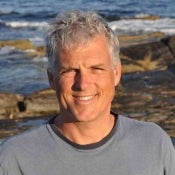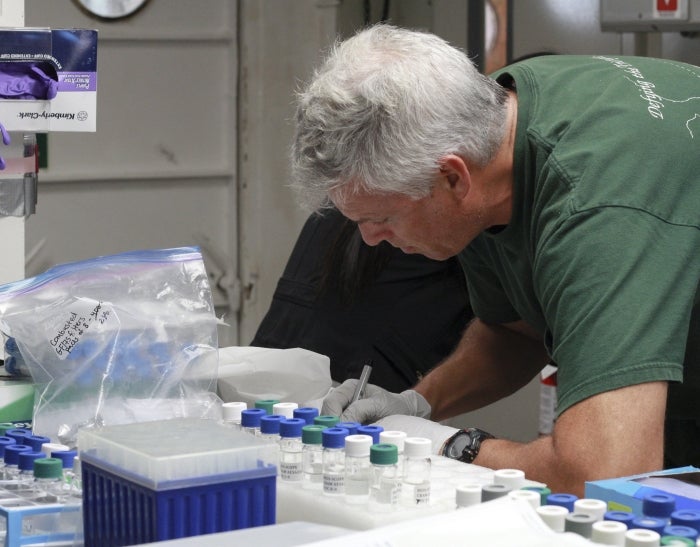Craig Carlson named director of ASU Bermuda Institute of Ocean Sciences

ASU BIOS’s 170-foot Atlantic Explorer research vessel at the Ferry Reach dock in Bermuda. Photo courtesy of BIOS
Craig Carlson, one of the planet’s leading marine biology researchers, has been appointed as the new director of and a professor in the Bermuda Institute of Ocean Sciences, a unit of the Julie Ann Wrigley Global Futures Laboratory at Arizona State University. His innovative research bridges marine microbiology and organic biogeochemistry, uncovering the intricate relationships between microbial community dynamics and dissolved organic matter biogeochemistry in ocean systems.
Carlson, who has collaborated with ASU BIOS scientists and staff in various capacities for over 35 years, takes over leadership of the institute from former President and CEO William Curry. Carlson’s association with ASU BIOS began in the late 1980s as a visiting researcher, becoming an institute faculty member in the mid-1990s. He has been a key contributor to foundational marine science projects in the Atlantic Ocean, including the Bermuda Atlantic Time-series Studyand the Microbial Observatory programs, which have provided more than 35 years of critical data toward resolving decadal changes in ocean biogeochemistry and associated microbial processes.
“Throughout his career, Craig Carlson has demonstrated vision and leadership in advancing ocean sciences,” said Peter Schlosser, vice president and vice provost of Global Futures at ASU. “As director of ASU BIOS, he will build on this experience to position the institute and the Global Futures Laboratory as a whole to be leading voices in shaping the future of ocean sciences with a focus on the oceans' role in a world under increasing pressure due to human overexploitation of the life-supporting systems of our planet.”
Carlson, who is married to Bermudian Alison Capstick Carlson and maintains deep and enduring connections to the island, brings a distinguished background in microbial oceanography, biogeochemistry and academic leadership to guide ASU BIOS into the future. Since 2001, Carlson has been a professor in the Department of Ecology, Evolution, and Marine Biology at the University of California, Santa Barbara.
"I am honored and excited for this opportunity,” Carlson said. “Interdisciplinary science has long been the spirit and centerpiece of the research programs at ASU BIOS. Analogous to the dynamic interactive environment of being at sea on a research vessel, ASU’s School of Ocean Futures and BIOS’s collaborative teams embrace real-time adaptive strategies to tackle critical challenges in marine science — an approach that leads to discoveries and solutions. ASU BIOS’s track record shows the power of collaboration in advancing our understanding of diverse marine environments, from inshore waters and coral reefs to the open ocean, and I am eager to join and contribute to its mission."
Carlson holds a bachelor's degree in biology from Colby College, a PhD in marine microbial ecology from the University of Maryland's Horn Point Laboratory, and completed postdoctoral research in organic biogeochemistry at BIOS.
Carlson has held numerous leadership roles throughout his career, including chair of his academic department, chair of the U.S. Ocean Carbon and Biogeochemistry Scientific Steering Committee and science director for BIOS-SCOPE, an international oceanographic research initiative in its 10th year.
BIOS-SCOPE brings together scientists from Bermuda, Europe, the U.K. and the U.S. to study ocean biogeochemical cycles, particularly the role of marine microbes in regulating the carbon cycle and sustaining life on Earth. A cornerstone of the program is fostering interdisciplinary collaborations to deepen understanding of organismal and chemical interactions across time and oceanic depths.
In addition, Carlson has served on the executive committee of the U.S. GO-SHIP program and editorial boards of leading scientific journals. His scientific contributions have earned him prestigious honors, including the American Geophysical Union’s Ocean Science Early Career Award (2002), the Association for the Sciences of Limnology and Oceanography’s G. Evelyn Hutchinson Award (2015), recognition as a fellow of the American Association for the Advancement of Science (2018) and an ASLO Sustaining Fellow (2024).
“I’m thrilled that Craig has agreed to lead BIOS as it embarks on a new era of marine science research and education with its new partner, ASU,” said Bill Curry, current president and CEO of ASU BIOS. “Craig is truly well qualified for the position. Not only has he earned the highest respect of his peers for his scholarship and collegiality, he has also been successful in leading diverse scientific teams addressing complex, interdisciplinary research questions — just the right combination of skills to lead ASU BIOS. I hope to see how the university and BIOS evolve together over the next 10 years. It should be terrific.”
More Environment and sustainability

The mighty impact of insects
By Meghan Finnerty and Megan NeelyArizona State University has a lot of insects — and for good reason. A colony of researchers is studying how social insects can be used as tools to answer…

Majority of American religious leaders silently believe in climate change, ASU study shows
Many Americans turn to religious leaders for guidance on matters of faith and morality.With this in mind, a new study, led by a researcher from Arizona State University, suggests that congregations…

A new university prototype for a thriving world
The challenges for our world’s health and the future of humanity and other life-forms command urgency — and the university is accelerating its wide-reaching collaborative work to help keep the planet…



